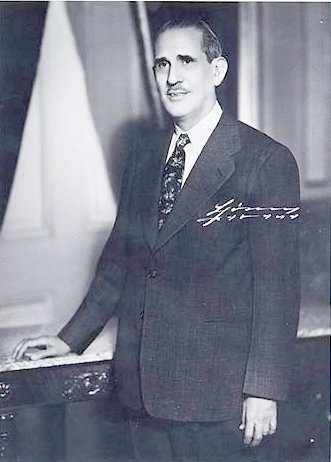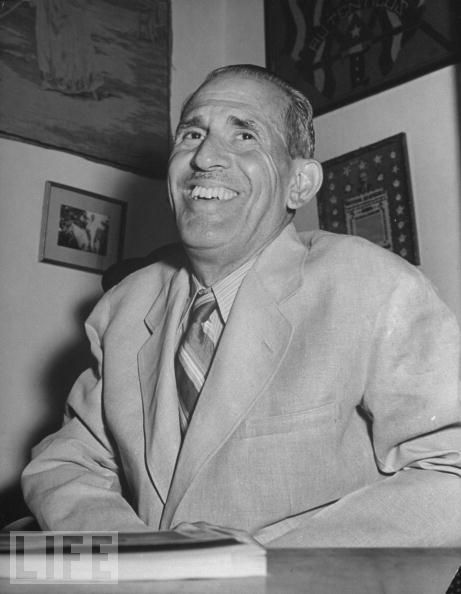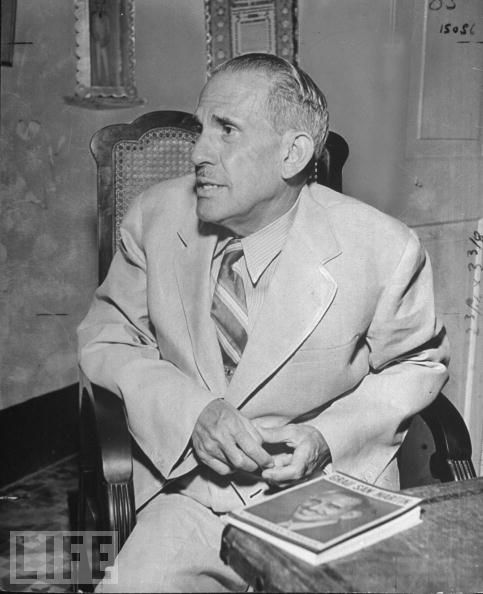<Back to Index>
- Mathematician Wilhelm Johann Eugen Blaschke, 1885
- Poet Julian Tuwim, 1894
- President of Cuba Ramón Grau San Martín, 1887
PAGE SPONSOR



Dr. Ramón Grau San Martín (September 13, 1887, La Palma, Pinar del Rio, Cuba – July 28, 1969, Havana, Cuba) was a Cuban physician and the President of Cuba (1933 – 1934, 1944 – 1948).
His mother, a rich tobacco grower, wanted him to continue in her footsteps, but he wanted to be a doctor. He studied at the University of Havana and graduated in 1908 with a degree of Doctor of Medicine. He then lived in Europe to expand his medical knowledge and returned to Cuba in 1921 and became a professor of physiology at the University of Havana.
In the 1920s he was involved with the student protests against then president Gerardo Machado, and in 1931 he was jailed. Upon his release he went into exile in the United States.
Though he initially became President, he was eventually marginalized by army chief of staff Fulgencio Batista, who distanced the military from other elements of the revolution and became de facto leader of Cuba behind the scenes. Batista forced Grau's resignation in 1934. That same year he went on to found the Partido Auténtico.
His niece, Pola Grau Alsina (1915 – 2000), served as First Lady of Cuba. Grau was instrumental in passing the 1940 Constitution of Cuba.
For much of the Constitutional Convention, he served as the presiding
officer (even after his coalition was pushed into the minority after
the defection of one of the parties that formed it). He would
eventually come to be replaced by Carlos Márquez Sterling. In 1940 Grau ran in the presidential election and lost to Fulgencio Batista. Most independent observers at the time qualified the 1940 election as free and fair elections. In 1944 Grau won the popular vote in the presidential election, defeating Carlos Saladrigas Zayas,
Batista's handpicked successor, and served until 1948. Despite his
initial popularity in 1933, accusations of corruption tainted his
administration's image, and a sizable number of Cubans began to
distrust him. As Grau assumed the presidency, he was forced to address many financial problems left by his predecessor, Batista. In a July 17, 1944 dispatch to the U.S. Secretary of State, U.S. Ambassador Spruille Braden stated: "It
is becoming increasingly apparent that President Batista intends to
discomfit the incoming Administration in every way possible,
particularly financially. A systematic raid on the Treasury is in full
swing with the result that Dr. Grau will probably find empty coffers
when he takes office on October 10. It is blatant that President
Batista desires that Dr. Grau San Matin should assume obligations which
in fairness and equity should be a matter of settlement by the present
Administration." After turning over the presidency to his protégé, Carlos Prío,
in 1948, Grau virtually withdrew from public life. He emerged again in
1952 to oppose Batista's coup d'état. Grau ran for president in
the 1954 and 1958 Batista sponsored elections but withdrew just prior to each election day, claiming government fraud. After the Cuban revolution and the rise of Fidel Castro in 1959, Grau retired to his home in Havana, where he died on July 28, 1969.